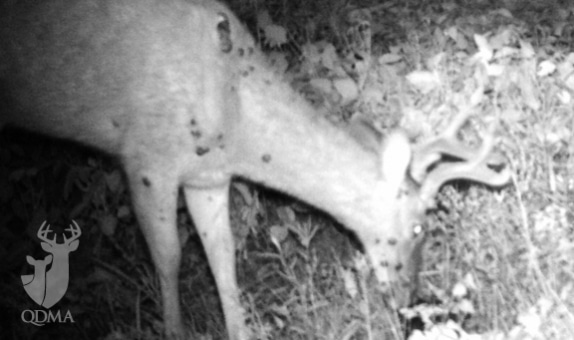Black spots on deer meat are typically caused by a reaction between the meat and the animal’s blood. These spots are generally harmless and do not indicate spoilage.
Hunters and chefs alike often come across black spots on deer meat, a sight which may raise concerns about the quality and safety of the meat. Understandably, any abnormality in the food we consume can lead to questions, and it’s important that these questions are addressed with accurate information.
Black spots, or discolorations, are usually the result of small blood vessels that burst during the butchering process or as a part of the natural decomposition of the meat post-mortem. While they might be unsightly, they typically do not affect the taste or safety of the venison if it has been properly processed and stored. It’s essential for those handling and preparing venison to recognize these spots and to know that simple trimming usually resolves the issue.

Credit: deerassociation.com
Black Spots On Deer Meat Revealed
Have you ever sliced into a venison steak and noticed mysterious black spots? These blemishes can be alarming. Hunters and home cooks alike value clean, healthy meat. So, what are these dark specks dotting your deer meat? Let’s unravel the mystery and understand whether your venison is still good to serve.
Identifying the Black SpotsIdentifying The Black Spots
Appearance matters when it comes to spotting these marks. Black spots on deer meat can range from tiny dots to larger patches. Recognizing them correctly is crucial for a safe, tasty meal.
- Size: Vary from pinpricks to large blotches.
- Texture: They may be smooth or slightly raised.
- Location: Spots can appear anywhere on the meat.
Spotting these signs early is key to addressing any potential issues with the meat.
Common Causes Behind the DiscolorationCommon Causes Behind The Discoloration
Several factors can lead to the formation of black spots on venison. Let’s explore the most common causes:
| Cause | Description |
|---|---|
| Processing | Improper field dressing or butchering can introduce bacteria. |
| Storage | Meat exposed to fluctuating temperatures may spoil. |
| Parasites | Deer can carry parasites, creating blackened areas post-harvest. |
| Blood Clots | Localized blood pooling after the hunt may look like dark spots. |
Understanding these causes helps ensure that your deer meat is safe and delicious.
Is Your Venison Safe?
Discovering black spots on deer meat can be concerning. It raises questions about the safety and quality of the venison on your plate. We’ll walk you through how to assess if these spots are a sign to steer clear or if your venison is still safe to enjoy.
Assessing Meat Quality
Determining the safety of your venison involves a few steps:
- Examine the Color: Fresh venison typically has a deep red hue. Small discolorations can occur but should not dominate the meat.
- Sniff Test: Fresh meat should have a clean, natural scent. Any off-odors are a red flag.
- Texture Check: The meat should feel firm to the touch, with no sliminess or tackiness.
Spots can be a result of bruising, blood clotting, or decomposition. Immediate butchering and proper cooling are crucial to prevent these issues.
When To Avoid Consuming Spotted Meat
You should avoid venison in the following situations:
- Large Black Masses: These could be signs of significant decay or infection within the animal.
- Foul Odor: Trust your nose; a bad smell means bad meat.
- Questionable Texture: Meat that is slimy or has an unexpected texture needs to be discarded.
Note the conditions of the hunt and the processing to better understand the meat’s appearance. Reach out to an experienced hunter or butcher if in doubt.
Culprits Behind Black Spots
Hunters often find unexpected black spots on deer meat. This raises concerns about meat quality. Knowing what causes these spots helps in understanding if the meat is safe to eat.
Parasites And Pathogens
Parasites, like ticks and flies, lay eggs on deer. These can turn into black spots on the meat. Pathogens can also create these spots. Two common ones are:
- Bacteria: Harmful bacteria may produce spots.
- Fungi: They can grow on meat, causing discoloration.
Post-harvest Contamination
After a deer is harvested, black spots could form. This happens from improper handling or storage. Keep meat clean and cool to stop this.
| Contamination Source | Prevention Tip |
|---|---|
| Dirt or Soil | Wash meat thoroughly. |
| Flies and Insects | Store in airtight containers. |

Credit: mdc.mo.gov
Preventing Unwelcome Spots
Preventing unwelcome spots on deer meat ensures the quality and safety of your harvest. Careful attention to field dressing, meat handling, and storage can make a significant difference. Follow these insights to enjoy spot-free and delicious wild game.
Best Practices In Field Dressing
Bleed and cool down the carcass immediately after the hunt. This slows bacteria growth. Use clean, sharp knives and wear gloves to minimize contamination. Keep the carcass dry and clean by avoiding contact with soil or leaves.
- Wear gloves to protect and reduce bacteria spread.
- Clean cuts actively prevent bacteria from entering the meat.
- Avoid soil contact to keep meat clean.
Proper Meat Handling And Storage
After field dressing, cooling the meat is essential to preventing unwanted spots. Hang the carcass in a cool, shaded area and transport it to a refrigeration unit as soon as possible. Store meat at temperatures below 40°F.
| Action | Benefit |
|---|---|
| Quick Cooling | Slows bacterial growth |
| Refrigerate | Keeps meat below 40°F |
- Cool immediately to prevent spoilage.
- Wrap in butcher paper or vacuum-seal for storage.
- Label with the date and use within one year.
When In Doubt – The Safe Approach
Discovering black spots on deer meat can be worrying. Safety is pivotal. Hunters and home cooks must ensure meat is fit to eat. To avoid health risks, it’s crucial to adopt a safe approach whenever meat quality is uncertain. In this section, we’ll guide you through expert advice and proper cooking temperatures.
Consulting Wildlife Experts
Upon finding black spots, seeking expert opinion is wise. Wildlife experts can assess whether the meat is safe for consumption. Reach out to local fish and game departments or experienced hunters for guidance.
Safe Cooking Temperatures For Venison
Even if meat looks fine, thorough cooking is crucial. Below are the recommended safe cooking temperatures for venison:
| Cut of Venison | Minimum Internal Temperature |
|---|---|
| Steaks & Roasts | 145°F (63°C) |
| Ground Venison | 160°F (71°C) |
Use a food thermometer for accurate temperature readings. Ensuring venison reaches these temperatures guarantees harmful bacteria are destroyed, making your meal safe to savor.

Credit: www.reddit.com
Frequently Asked Questions For Black Spots On Deer Meat
What Causes Black Spots On Deer Meat?
Black spots on deer meat often result from the presence of blood clots or bruising. This can occur if the animal was injured while being harvested. Cooking may cause the spots to darken further.
Are Black Spots On Venison Safe To Eat?
Typically, black spots on venison are harmless and merely cosmetic. They do not indicate spoilage if the meat smells and looks otherwise normal. However, use caution and inspect for other spoilage signs.
How Can Black Spots Affect Venison Taste?
Black spots on their own shouldn’t affect the taste of venison significantly. However, if the spots are symptoms of deeper tissue damage, there could be a slight gamey or off-flavor.
Is There A Way To Prevent Black Spots On Deer Meat?
To prevent black spots, quickly and properly field dress the deer to avoid blood clotting. Also, handle the carcass gently during transportation to reduce bruising.
Conclusion
Understanding what those black spots on deer meat mean is crucial for both hunters and consumers. It ensures the safety and quality of your venison. Remember, proper identification and handling are your best defense. Keep enjoying your hunting adventures and savory venison meals, knowing you’re well-informed.


